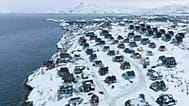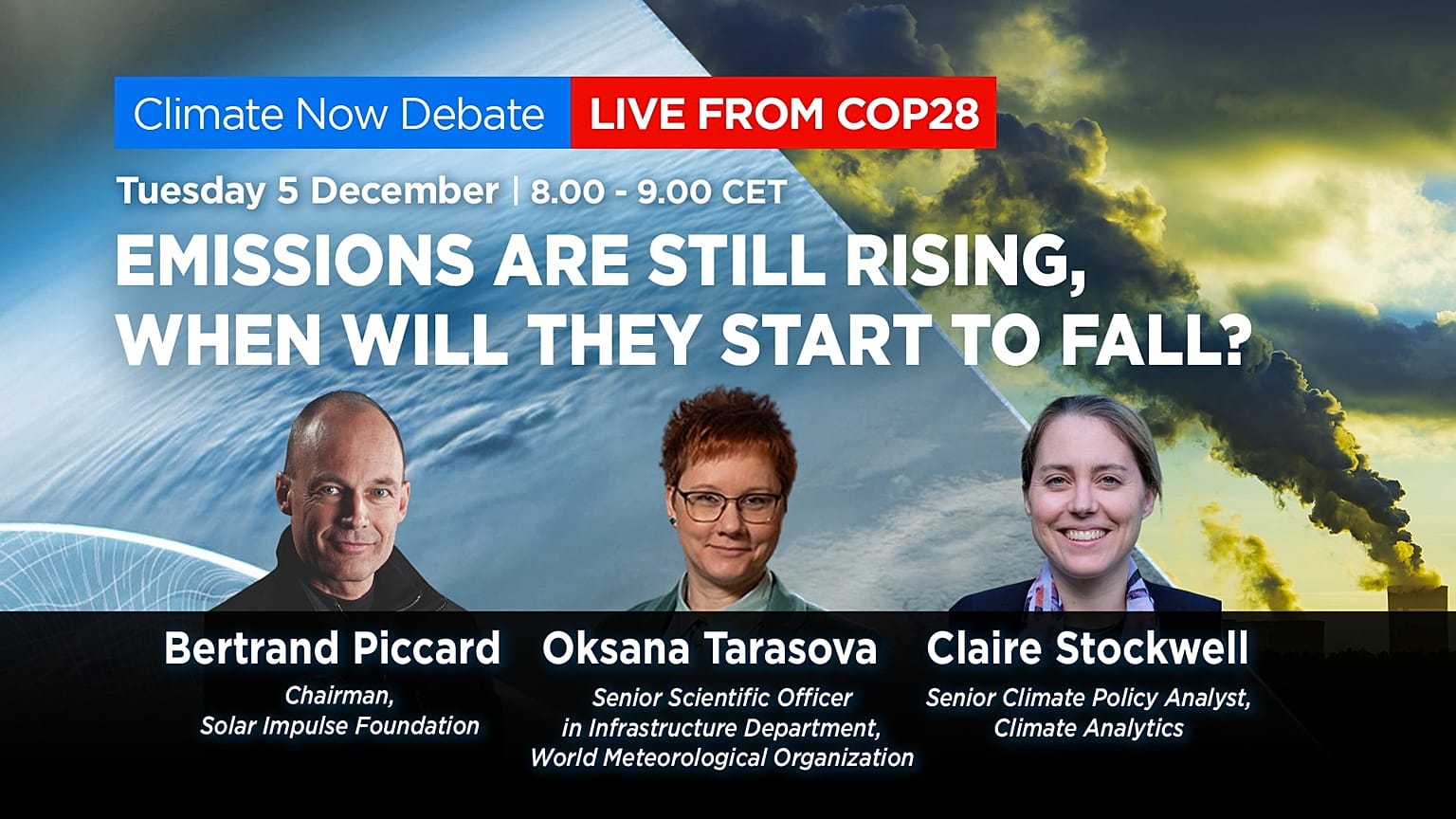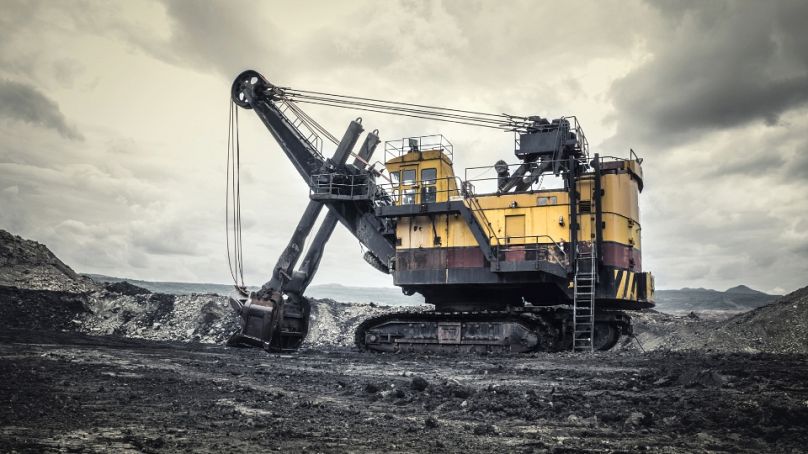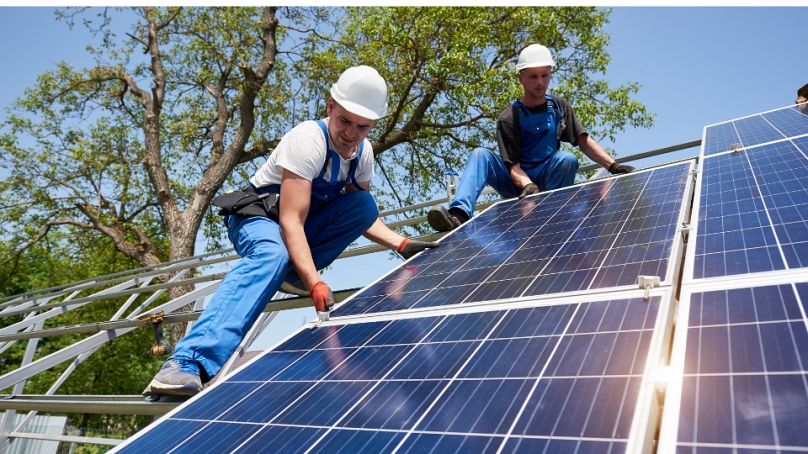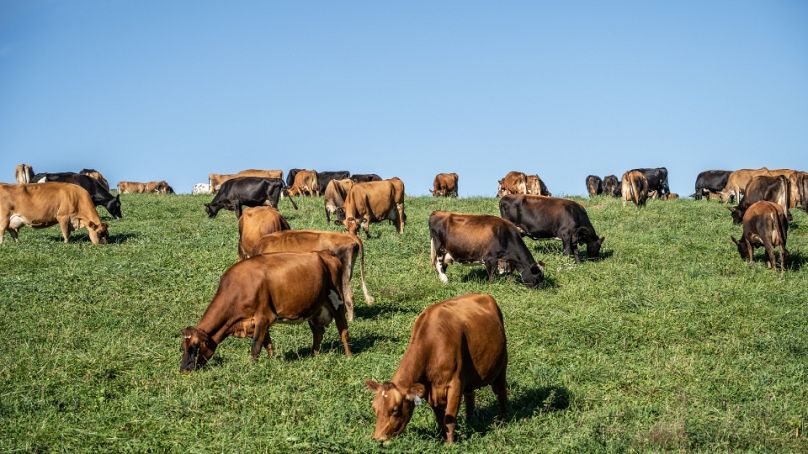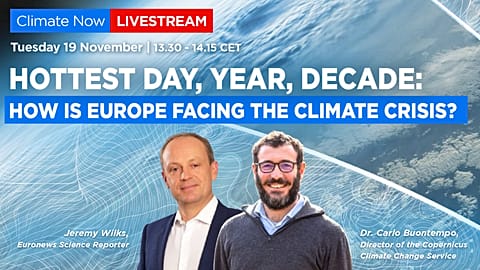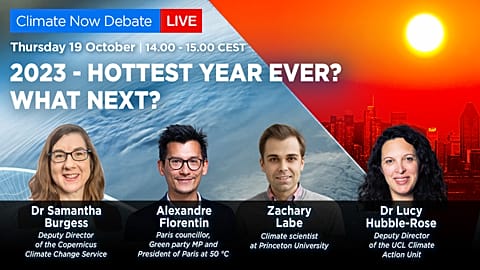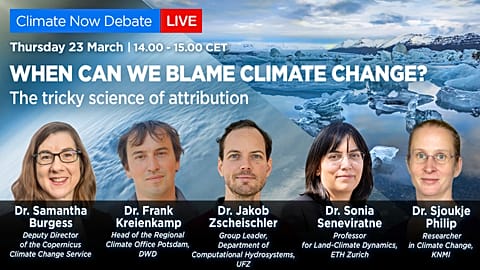For our latest Climate Now Debate, broadcast live from COP28, we discussed what rising emissions mean for a warming world.
Despite repeated warnings from climate scientists, greenhouse gas emissions (GHGs) are still rising, with CO2 concentrations predicted to reach a record high in 2023.
 ADVERTISEMENT
ADVERTISEMENT
 ADVERTISEMENT
ADVERTISEMENT
"Unfortunately the greenhouse gas concentrations in the atmosphere are continuing to grow and continuing to grow pretty fast," said Oksana Tarasova, Senior Scientific Officer in the Infrastructure Department, World Meteorological Organization and one of our panellists at our Climate Now event on the sidelines of COP28.
"The global average for 2022 was 417.9 parts per million. I think that this year, we will get another 2 plus ppm increase."
You can watch a replay of the Climate Now debate, which took place live in Dubai, here:
Meet our panellists
Bertrand Piccard, Chairman, Solar Impulse Foundation
Oksana Tarasova, Senior Scientific Officer in Infrastructure Department, World Meteorological Organization
Claire Stockwell, Senior Climate Policy Analyst, Climate Analytics
Moderator, Jeremy Wilks, Euronews
Leaders at COP28 need to commit to phasing out fossil fuels
This comes as many expect last month to set a new high as the warmest November on record, following a year of recording breaking figures from the Copernicus Climate Change Service.
From wildfires in Europe to floods in Pakistan, the reverberations of our failure to reduce emissions are being felt on a global scale. The IPCC says emissions must peak before 2025 if we are to meet the targets of the Paris Agreement, but time is rapidly running out.
According to Claire Stockwell, Senior Climate Policy Analyst at Climate Analytics, and another of our panellists, there are still glimmers of hope on the horizon.
"In the numbers that we put out today, we did see that there’s a significant jump in [emissions] in Indonesia, in our estimates, because of the extended coal use in that country," she explained.
"But at the same time, in China, until 2030 it’s not particularly positive, but after 2030 there are glimmers that they will be starting structural decline in coal use and that renewables could really take over."
Over 110 countries at COP28 have agreed to triple their renewable energy capacity by 2030, but this decision has not yet been ratified. Stockwell was keen to stress that this commitment has to be backed up with action on fossil fuels too.
"It can’t just be a positive renewable story," she said.
"The flip side is also committing to phasing out fossil fuels and that governments then go home from this meeting and start to take more action, in this critical decade, to cut their emissions."
Why are emissions still rising and what does this mean for the atmosphere?
The Climate Action Tracker (CAT) report released on December 5 is one of the most highly-regarded and hotly-awaited scorecards on progress to reduce emissions.
"Since Paris, it does show that the temperature has come down," explains Stockwell, "so we do think these meetings are working, they’re just not working fast enough."
While predicted temperatures have reduced, sadly over the past three years this decline has stopped and trackers show that estimated temperatures have remained more or less unchanged, and potentially even increased.
CAT assesses several different factors when preparing its scorecards. "If we start with the real-world action, that’s, unfortunately, the most negative story I have for you," said Stockwell.
"That’s 2.7°c by the end of the century and that has not changed in the past three years and it’s almost double the Paris Agreement’s 1.5°c limit."
This number falls to 2.5°c if governments follow through with targets they say they will deliver by 2030, while if net-zero targets by 2050 are met, CAT estimates the figure will fall to potentially 1.8°c.
But Stockwell stressed that "our estimates are medians, so that's a 50 per cent chance."
While meeting targets like net zero is hugely important, Tarasova was keen to explain that climate mitigation models can sometimes make assumptions too, which could cause problems with predicted figures.
"The atmosphere does not lie and what we see in the atmosphere is a continuous increase in concentrations," she explained."And what we also see are some pretty worrisome signals which are happening within natural systems, and that is not part of any mitigation.
"When you look at mitigation action, they always assume that 50 per cent of the emissions will be taken out by the forest or by the ocean, but the reality is that these natural systems are also getting stressed."
Due to deforestation, drought and extreme weather events, some parts of the Amazon are now emitting CO2 rather than absorbing it, making GHG emissions even worse, Tarasova explained.
What can be done to reduce emissions?
You have to start by understanding that we are in a world of waste," said Bertrand Piccard, Chairman of the Solar Impulse Foundation.
"Our world is inefficient. We are wasting three-quarters of the energy that is produced, 30 per cent of the food, the majority of natural resources. We are wasting 95 per cent because we don’t understand that it can go into a circular economy."
Piccard, whose Solar Impulse Foundation has devised over 1,000 solutions that it hopes will address environmental challenges without compromising economic growth, believes that one of the keys to reducing this waste is legislation.
"You need a legal framework that obliges both industry and citizens to be more efficient. Stop losing the wasted heat, go into a circular economy with the waste, recycle water instead of getting rid of it," he said.
Piccard added that he believed that the wrong people were being attacked over climate change, and, in reality, everyone needs to bear some of the responsibility.
"We are attacking the people who are producing oil, but we are not aware that as citizens we are using this oil every minute of our life, we are consuming this oil. Everything is about oil.
"So we also need to say to the population: 'Reduce your consumption of oil and it will reduce the production of oil'," he stated.
Bertrand highlighted that solar and wind energy are now much cheaper than oil, gas and coal, and therefore everyone using fossil fuels is wasting money.
Tarasova was keen to point out that the assumption that solar energy was cheaper depends on where in the world you are living.
"The problem is that in the current world, it is not just about the energy," she explained.
"We’ve seen that in Africa, there was a UNEP emission report which actually shocked me, if you look at the renewables in Africa, somehow there is a belief that development is associated with fossil fuel.
"There is no notion that you can develop without fossil fuel. And you would be surprised, but the cost of solar energy in Africa is substantially higher than it is in the developed world."
While there has been much talk at COP28 of the need for developing countries to leapfrog fossil fuels and move straight to renewables, Tarasova stated that there seems to be a desire to maintain the status quo when it comes to fossil fuels.
"The reason being that it is beneficial to keep the continuity of the business, so that somebody is on the hook, consuming fossil fuel," she said.
"And to do this you link development with fossil fuels. And that’s a problem."
What is the EU doing to reduce emissions?
The EU, meanwhile, is hoping to limit "carbon leakage", which happens when companies based in the EU move carbon-intensive production to non-EU countries with less stringent climate policies.
The EU’s Carbon Border Adjustment Mechanism (CBAM) aims to put a fair price on the carbon emitted during the production of carbon-intensive goods entering the bloc, both to encourage cleaner production and ensure its climate objectives aren't undermined.
However, Tarasova noted that this new mechanism could cause problems for countries outside of the EU.
"I work with CATIE, which is an agricultural research institute working in South America, and they are particularly stressed with this carbon border adjustment.
"Many countries in Latin America don't have industrial agricultural facilities so they are still based on small farming and for them this is pretty tough.
"There is a risk that a substantial part of their agriculture will become non-profitable because small farms cannot address their management practices based on those laws."
Both Stockwell and Tarasova agreed the EU should focus on cutting methane.
"The regulations that they’ve put forward for methane are good, but if the EU is really serious about meeting the global methane pledge it’s going to have to attack the methane coming from the agricultural sector," said Stockwell, "which they currently haven't done."
According to Oksana, methane has a lifetime of around 12 years, so if we stop using it, it will also reduce in the atmosphere quite quickly.
"We would see with methane those actions very quickly reflected in the atmosphere," she said. Even if all methanes were controlled by 2050, she continued, this would only limit warming by around 0.2°c.
So what outcomes did our panellists hope to see by the end of COP28?
Stockwell hoped to see "the tripling of renewables and the doubling of energy efficiency," while Tarasova "really hoped the science is heard."
Finally, Piccard hoped that delegates would sound a more optimistic note: "I think if they put the solutions on the table instead of the problems, it’ll go much, much faster and with better results."




